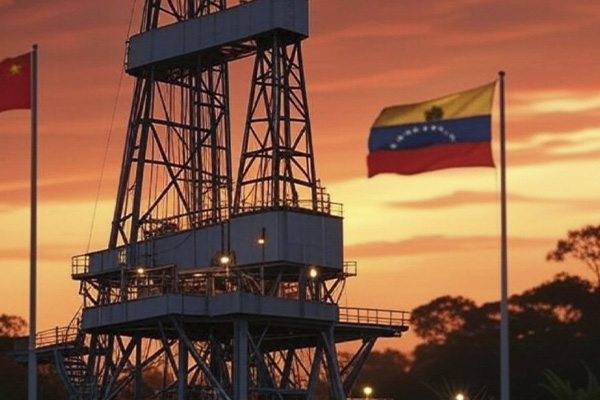
China’s Concord Resources to Invest $1 Billion in Venezuela’s Maracaibo Oil Fields Under 20-Year Pact
Caracas/Beijing — August 25, 2025.
A new agreement between the government of Nicolás Maduro and the Chinese private firm Concord Resources Ltd. marks a major turning point in Venezuela’s oil sector, as Beijing deepens its footprint in the crisis-stricken South American country despite heavy international sanctions.
According to officials close to the negotiation, Concord Resources has committed to investing over $1 billion in revitalizing production in the Lake Maracaibo oil fields, one of Venezuela’s most historic but decaying energy hubs. The 20-year pact grants the Chinese company long-term operational and commercial rights in exchange for infrastructure development, maintenance, and guaranteed supply channels to China.
A Lifeline for Venezuela’s Oil Industry
Once Latin America’s largest crude exporter, Venezuela’s oil industry has been in freefall for more than a decade due to underinvestment, corruption, and the weight of U.S. and European sanctions targeting the state-run company Petróleos de Venezuela (PDVSA). Output at Lake Maracaibo—once the beating heart of Venezuela’s energy sector—has dropped dramatically, with many wells abandoned and facilities in severe disrepair.
The partnership with Concord Resources is expected to inject fresh capital and technology into operations. Analysts say the deal could boost production by 200,000 barrels per day within the next five years, although much will depend on infrastructure rehabilitation and political stability.
“This is a survival pact for Maduro,” said Francisco Monaldi, an energy policy expert at Rice University’s Baker Institute. “Without foreign partners willing to take on the risks, Venezuela cannot meaningfully recover oil output. China is signaling that it is willing to play the long game.”
Beijing’s Strategic Bet
The move underscores China’s growing dominance in Venezuela’s oil sector. Despite sanctions, China already absorbs more than 90% of Venezuelan crude exports, often through intermediaries and complex shipping arrangements that mask the oil’s origin.
By securing long-term stakes, Beijing strengthens its position as Venezuela’s largest creditor and most reliable geopolitical partner. Since the early 2000s, China has extended more than $60 billion in loans to Caracas, much of it to be repaid with oil. Although repayment has slowed amid Venezuela’s economic collapse, Beijing has avoided public confrontation, instead tightening its grip through direct investment.
“China is playing a dual strategy,” explained a Latin American energy consultant based in Bogotá. “It keeps buying discounted Venezuelan oil, while locking in strategic control over production assets for the next two decades. This ensures steady supply lines regardless of global political turbulence.”
Defying Sanctions and the West
The agreement also highlights the erosion of U.S. sanctions’ effectiveness. Washington imposed sweeping restrictions on Venezuelan oil sales in 2019, aiming to force Maduro from power. Yet the sanctions regime has struggled to halt Venezuela’s energy trade, as China, Russia, and Iran stepped in to fill the void.
Western diplomats fear the new Concord deal could further insulate Maduro from financial pressure. With Chinese investment, the regime may gain enough revenue to stabilize its fragile economy and extend its hold on power ahead of the 2024–2025 electoral cycle.
For the United States and the European Union, the development presents a dilemma: whether to increase enforcement of sanctions or explore new diplomatic channels with Caracas.
Risks Ahead
Despite the promise of fresh capital, questions remain over whether the pact can overcome Venezuela’s systemic challenges. Infrastructure sabotage, power outages, corruption within PDVSA, and insecurity around oil installations could all undermine production gains.
Moreover, environmentalists warn that renewed large-scale drilling in Lake Maracaibo—a region already suffering severe pollution from oil spills and gas flaring—could worsen ecological degradation. “China and Venezuela are focused on profit, not sustainability,” said a Venezuelan environmental NGO leader who requested anonymity for fear of reprisals.
A Long Road
For Maduro, the deal is both a political victory and a gamble. It provides immediate legitimacy by showcasing foreign backing at a time of diplomatic isolation. For China, it represents a strategic lock-in of energy resources at discounted rates, strengthening its influence in the Western Hemisphere.
But for Venezuelans, the benefits are far from guaranteed. Oil wealth has long fueled corruption and inequality, and critics argue that unless governance improves, new revenues may only reinforce the status quo.
“History tells us that oil money in Venezuela rarely trickles down,” said an independent Caracas-based economist. “Without transparency, this deal could simply entrench Maduro’s regime for another 20 years.”